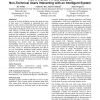215 search results - page 23 / 43 » Learning to Predict User Operations for Adaptive Scheduling |
IPPS
1999
IEEE
14 years 22 days ago
1999
IEEE
The rapid progress in high-performance microprocessor design has made it di cult to adapt real-time scheduling results to new models of microprocessor hardware, thus leaving an un...
CHI
2007
ACM
14 years 8 months ago
2007
ACM
In order to develop intelligent systems that attain the trust of their users, it is important to understand how users perceive such systems and develop those perceptions over time...
CE
2008
13 years 8 months ago
2008
The portability and immediate communication properties of mobile devices influence the learning processes in interacting with peers, accessing resources and transferring data. For...
AAAI
2007
13 years 10 months ago
2007
The mobile Internet is a massive opportunity for mobile operators and content providers, but despite significant improvements in handsets, infrastructure, content, and charging m...
ICANN
2005
Springer
14 years 2 months ago
2005
Springer
One aim of Meta-learning techniques is to minimize the time needed for problem solving, and the effort of parameter hand-tuning, by automating algorithm selection. The predictive m...

